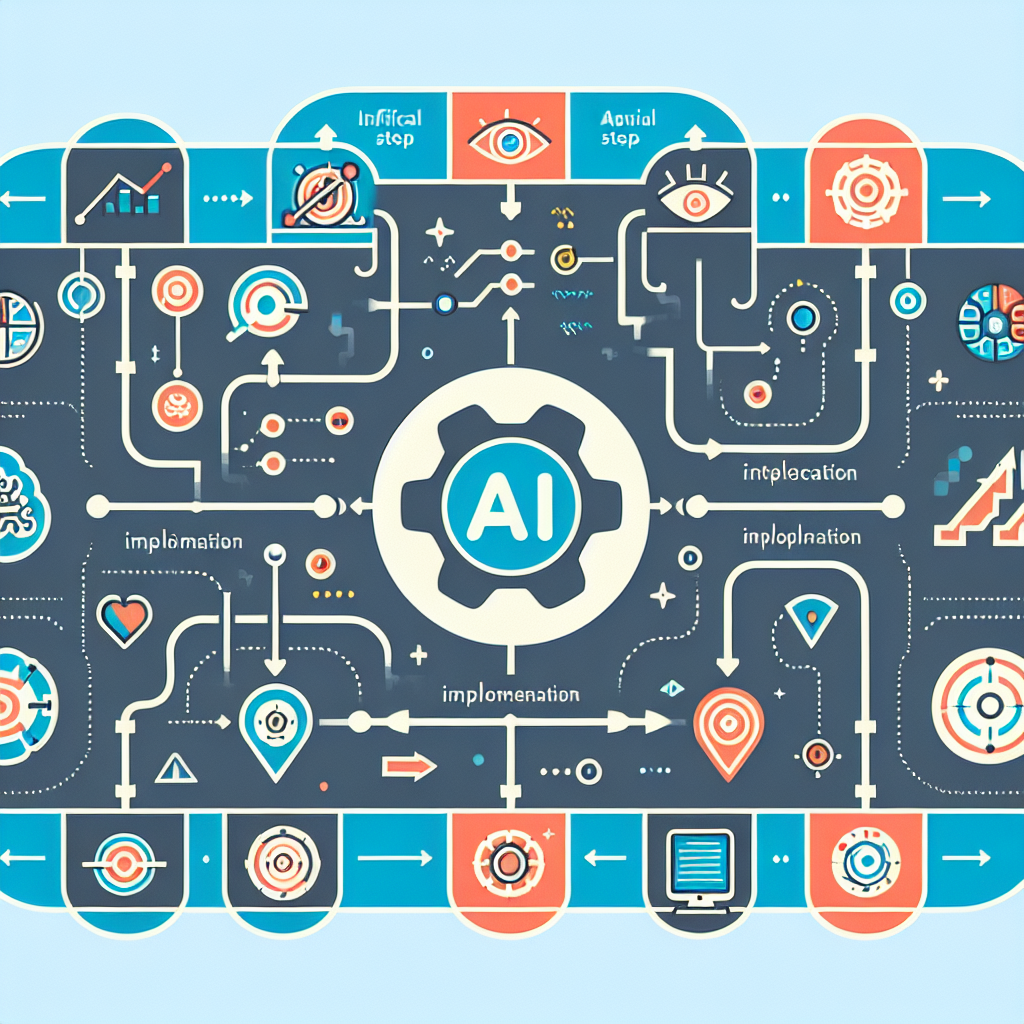Introduction
Imagine having a virtual assistant that not only schedules your meetings but also analyzes data trends to predict your next big move. That’s the power of integrating AI into corporate strategy! It’s not just about automating mundane tasks; it’s about enhancing decision-making processes and driving strategic advantages that put you ahead of the competition.
In this roadmap, we’ll dive deep into how you can leverage AI for business success. From crafting tailored AI-driven business strategies to implementing machine learning in strategic planning, we’ll explore every nook and cranny of this transformative technology. So grab your digital toolkit, because we’re about to embark on a journey that will reshape your operational efficiency and customer experience!
Did you know? According to recent studies, 93% of companies are currently undergoing some form of digital transformation. This isn’t just a fleeting trend it’s the future of business!

The Importance of AI in Business Strategy
In today’s fast-paced corporate landscape, AI in business strategy isn’t just a buzzword; it’s a game changer. Businesses are increasingly recognizing that integrating artificial intelligence into their strategic planning is not merely beneficial it’s essential for survival and growth.
Think of AI as the secret sauce that transforms your traditional business recipe into a Michelin-star dish. It’s not just about having the right ingredients; it’s about knowing how to blend them perfectly to create something extraordinary.
Did you know that companies implementing AI-driven business strategies report up to a 40% increase in productivity? That’s not just impressive; it’s downright revolutionary!
Overview of Artificial Intelligence in Business
The rise of AI has led to the emergence of new paradigms in business operations. From automating mundane tasks to providing insights through data analytics, AI is reshaping the corporate landscape. Organizations leveraging AI can analyze vast amounts of data quickly, enabling them to make informed decisions and respond agilely to market changes.
Significance of AI-Driven Business Strategies
AI in corporate strategy provides a competitive advantage by optimizing processes and enhancing productivity. By harnessing machine learning algorithms, companies can predict customer behavior, streamline operations, and ultimately drive profitability. It’s like having a crystal ball that helps you see where the market is headed.
The Role of AI for Business Growth
Integrating AI into your business model isn’t just about keeping up with trends; it’s about positioning your company for sustainable growth. Whether it’s through improving customer engagement or enhancing operational efficiency, the potential for growth with AI is immense. For instance:
- Predictive analytics: Helps anticipate market trends and customer needs.
- Intelligent automation: Reduces operational costs while improving service delivery.
- Enhanced decision-making: Facilitates data-driven strategies that lead to better outcomes.
The future of business strategy lies in harnessing the power of artificial intelligence. Companies that adopt these technologies will not only enhance their operational efficiency but will also enjoy improved customer satisfaction and loyalty.

Understanding AI Technologies and Their Applications
Welcome to the fascinating world of AI in business strategy! Here, we’ll unravel the intricate web of technologies that are revolutionizing how companies operate. Think of artificial intelligence as the Swiss Army knife of modern business versatile, powerful, and indispensable for cutting through inefficiencies.
Let’s break down some key technologies and their applications:
-
Machine Learning in Business Strategy
Machine learning (ML) is like having a super-smart assistant who learns from data. Instead of relying solely on human intuition, businesses can now harness ML algorithms to analyze trends, predict outcomes, and optimize operations. For instance, retailers use ML to forecast inventory needs by analyzing purchasing patterns saving time and money while enhancing customer satisfaction.
-
AI-Powered Decision Making
Imagine having a crystal ball that not only tells you the future but also suggests the best course of action. That’s what AI-powered decision making does! By leveraging vast amounts of data, AI helps leaders make informed choices quickly. Companies like Netflix use AI algorithms to recommend content based on user preferences, ensuring higher engagement and retention rates.
-
Predictive Analytics in Business Strategy
This is where the magic happens! Predictive analytics uses historical data combined with statistical algorithms to forecast future outcomes. For example, financial institutions utilize predictive models to assess credit risk more accurately. By anticipating potential defaults before they happen, businesses can mitigate risks and enhance profitability.
Key Takeaway: Integrating these AI technologies into your business strategy not only streamlines processes but also provides a competitive edge in today’s fast-paced market.

The strategic use of artificial intelligence doesn’t stop here; it opens doors to new opportunities for operational efficiency and innovation through AI solutions. As we move forward in this digital transformation era, understanding these technologies will be crucial for anyone looking to leverage AI for business success.
Ready to dive deeper? Let’s explore how to develop a practical AI implementation roadmap next!
Developing an AI Implementation Roadmap
Creating a successful AI implementation roadmap is like planning a road trip: you need a destination, a map, and a vehicle that can handle the terrain. For businesses looking to incorporate AI in business strategy, this roadmap is essential for navigating the complexities of artificial intelligence in business.
1. Assessing Current Business Processes
The first step on your journey is to take stock of your current situation. This involves:
- Mapping Out Existing Processes: Identify workflows that could benefit from AI integration.
- Identifying Pain Points: Look for areas where inefficiencies or bottlenecks occur; these are prime candidates for AI solutions.
- Evaluating Data Availability: Ensure you have access to quality data, as it’s the fuel that powers AI-driven business strategies.
2. Setting Clear Objectives for AI Initiatives
You wouldn’t set off on a road trip without knowing your destination, right? The same goes for implementing AI. Here’s how to set those crucial objectives:
- Define Success Metrics: What does success look like? Is it increased efficiency, cost reduction, or enhanced customer experience?
- Create Specific Goals: Instead of vague aspirations, aim for measurable targets like “reduce processing time by 30% within six months.”
- Align with Business Strategy: Ensure that your AI goals complement your overall corporate strategy and objectives.
3. Creating a Tailored Roadmap for Implementation
Your roadmap should be as unique as your business. Consider the following components when crafting it:
- Selecting Technologies: Choose the right AI technologies that align with your goals, whether it’s machine learning, natural language processing, or predictive analytics in business strategy.
- Tactical Planning: Break down the implementation into phases pilot projects can help mitigate risks before full-scale deployment.
- User Training and Adoption: Equip your team with the necessary training to successfully leverage AI tools and foster a culture of innovation through AI in business.

This roadmap isn’t just about technology; it’s about integrating smart solutions into your corporate strategy. By focusing on these steps, you’ll be well on your way to harnessing the power of artificial intelligence for operational efficiency and competitive advantage.
Integrating AI into Business Models
As businesses navigate the choppy waters of the digital age, integrating AI into business models is no longer just a luxury it’s a necessity. Think of AI as your business’s new best friend, ready to help you optimize processes, enhance customer experience, and drive growth like never before.
Leveraging AI for Operational Efficiency
Imagine having a super-efficient assistant that never sleeps. That’s what leveraging AI for operational efficiency feels like! From automating mundane tasks to analyzing vast datasets in real-time, AI can significantly streamline operations. By implementing AI-driven business strategies, companies can reduce costs and increase productivity. For instance:
- Predictive Maintenance: Using machine learning algorithms to predict equipment failures before they happen.
- Supply Chain Optimization: Automating logistics and inventory management through intelligent systems.
- Customer Support Automation: Deploying chatbots that handle customer inquiries 24/7, freeing up human agents for complex issues.
Automation in Business Strategy: Benefits and Challenges
The benefits of automation are clear: increased speed, reduced errors, and cost savings. However, it’s not all sunshine and rainbows. Businesses must also confront challenges such as:
- Cultural Resistance: Employees may resist changes brought by automation due to fear of job loss or unfamiliarity with new technologies.
- Initial Investment Costs: Implementing AI solutions can require significant upfront investment that may deter smaller companies.
- Data Privacy Concerns: As businesses collect more data for AI systems, ensuring compliance with regulations becomes crucial.
The Role of Intelligent Automation in Businesses Today
Intelligent automation, which combines AI with robotic process automation (RPA), is transforming industries by enabling businesses to achieve higher levels of efficiency and flexibility. Companies like Amazon utilize intelligent automation to manage their extensive logistics networks efficiently. This integration not only enhances operational efficiency but also provides a competitive edge in the marketplace.
Key Takeaway: Integrating AI into your business model is essential for staying competitive. Embrace both the benefits and challenges to harness its full potential!
AI and Competitive Advantage: Strategies for Success
In today’s fast-paced business environment, leveraging AI in business strategy isn’t just a nice-to-have; it’s a must-have. Companies that successfully integrate artificial intelligence into their operations are not just keeping up, they’re setting the pace. So, how can you harness AI to gain a competitive edge? Let’s dive into some strategies that can propel your organization to the forefront of innovation.
Strategic Advantages of Using AI in Corporate Environments
The strategic use of artificial intelligence can transform mundane processes into agile, efficient operations. Here are a few ways AI can offer significant advantages:
- Enhanced Decision-Making: With AI-powered decision-making, businesses can analyze vast amounts of data quickly, resulting in more informed choices that align with corporate objectives.
- Operational Efficiency: Automation in business strategy enables the streamlining of processes, reduces costs, and frees up human resources for more creative tasks.
- Predictive Analytics: Utilizing predictive analytics in business strategy enables the anticipation of market trends and customer behaviors, allowing for proactive adjustments to strategy.
The Future of Business Strategy with Artificial Intelligence
The future is bright for those who embrace AI. As machine learning continues to evolve, businesses will find new ways to optimize operations and enhance customer experiences. Imagine a world where:
- Real-Time Insights: Companies leverage real-time data analytics to adapt marketing strategies instantly based on customer interactions.
- Personalized Experiences: Businesses utilize AI to create hyper-personalized products and services tailored specifically to individual preferences.
- Sustainable Growth: With advanced analytics for strategic decision-making, companies can pursue growth strategies that are not only profitable but also sustainable.
Innovation Through AI in Business: Case Studies and Examples
Diving into real-world applications provides clarity on how organizations are successfully integrating AI. Here are some examples:
Coca-Cola’s Use of AI: The beverage giant employs machine learning algorithms to optimize its supply chain management, ensuring products are available where and when they’re needed most.
Amazon’s Recommendation Algorithms: By analyzing customer behavior through predictive analytics, Amazon personalizes shopping experiences boosting sales while enhancing customer satisfaction.
Zara’s Inventory Management: Using AI for market analysis, Zara predicts fashion trends and adjusts inventory accordingly, reducing waste while maximizing sales opportunities.
The key takeaway? Embracing artificial intelligence in your corporate strategy isn’t just about keeping pace; it’s about leaping ahead. By understanding how AI can be strategically implemented across various facets of your organization, you position yourself not just as a participant but as a leader in your industry. So why wait? Start exploring how you can integrate these strategies today!
The Role of Advanced Analytics in Strategic Decision-Making
In the fast-paced world of AI in business strategy, advanced analytics is like the secret sauce that turns a good dish into a gourmet experience. It’s not just about having data; it’s about how you use it to make strategic decisions that can propel your business forward.
Advanced analytics leverages techniques such as machine learning and predictive modeling to sift through mountains of data, revealing patterns and insights that might otherwise go unnoticed. This is where the magic happens! Companies are shifting from gut-feeling decisions to data-driven strategies, ensuring that every move is calculated and informed.
Key Takeaway: Implementing advanced analytics can significantly enhance your decision-making process, enabling more precise forecasting and informed strategy formulation.
Data-Driven Business Strategies: Best Practices for Implementation
- Start with clean data: Garbage in, garbage out. Ensure your data is accurate and relevant.
- Invest in the right tools: Choose analytics platforms that align with your business needs.
- Foster a culture of data literacy by encouraging team members at all levels to understand and utilize analytics in their roles.
AI and Market Analysis: Gaining Insights from Data Trends
The integration of AI into market analysis allows businesses to anticipate trends before they become apparent. For instance, retailers can utilize predictive analytics to manage inventory based on anticipated customer demand, thereby avoiding both stockouts and overstock situations. This kind of foresight provides a substantial competitive edge.
Moreover, companies can analyze customer behavior through advanced segmentation techniques powered by machine learning, which enables them to tailor marketing strategies more effectively. Imagine knowing precisely what your customers want before they even realize it themselves!
“Companies that leverage AI for market analysis are not just reacting to trends; they are creating them.”
By harnessing the power of advanced analytics, businesses can optimize their operations and enhance overall performance. This strategic use of artificial intelligence doesn’t just improve efficiency; it transforms how companies interact with their customers, paving the way for sustained growth and innovation.
The Importance of AI in Business Strategy
- Overview of artificial intelligence in business
- AI-driven business strategies and their significance
- The role of AI for business growth
Understanding AI Technologies and Their Applications
- Machine learning in business strategy
- AI-powered decision-making and its impact on operations
- Predictive analytics in business strategy
Developing an AI Implementation Roadmap
- Assessing current business processes and identifying opportunities for AI integration
- Setting clear objectives for AI initiatives
- Creating a tailored roadmap for implementation
Integrating AI into Business Models
- Leveraging AI for operational efficiency
- Automation in business strategy: Benefits and challenges
- The role of intelligent automation in businesses today
AI and Competitive Advantage: Strategies for Success
- Strategic advantages of using AI in corporate environments
- The future of business strategy with artificial intelligence
- Innovation through AI in business: Case studies and examples
The Role of Advanced Analytics in Strategic Decision-Making
- Data-driven business strategies: Best practices for implementation
- AI and market analysis: Gaining insights from data trends

















Leave a Reply